In a climate charged with political tension and economic uncertainty, President Donald Trump’s relentless barrage against Federal Reserve Chair Jerome Powell is more than mere discontent; it’s a dangerous spectacle that threatens the very fabric of American economic stability. Trump’s disdain for Powell, particularly regarding the Federal Reserve’s interest rate policies, has escalated to the point where it raises serious questions about the sanctity of the Federal Reserve as an independent institution. What previously seemed like political shenanigans has morphed into a risky game with potentially catastrophic consequences for the financial markets and the economy at large.
The Interference of Politics in Economic Policy
Trump’s recent comments, where he chided Powell for not lowering interest rates amid declining prices, reflect a fundamental misunderstanding of the complexities that the Federal Reserve navigates. Indeed, the economy is not merely a series of numbers and rates that can be manipulated on a whim to achieve desired outcomes. Trump’s public assertion that Powell should cut rates illustrates a troubling attempt to wield political influence over monetary policy, which should remain insulated from the caprices of any administration.
While Trump declares that a Fed Chairman who “understood what he was doing” would act differently, such statements expose the fragility of economic discourse in a political sphere that prioritizes immediate gratification over long-term stability. Economic policy should be built upon empirical evidence and forecasts, not a reaction to the political whims of a president seeking to maintain a favorable image.
A Threat to the Independence of the Federal Reserve
What is most alarming is the discussion circulating within the White House about the potential to remove Powell from his post. Economic adviser Kevin Hassett’s observations that Trump’s team is contemplating a legal framework to facilitate Powell’s ousting hint at a seismic shift in how the executive branch might interact with the Federal Reserve. Such thoughts should send chills down the spine of anyone who understands the intricacies of U.S. economic governance. A move to dismiss Powell would signify an unprecedented level of executive intervention in a body designed to operate independently of the political sphere.
Senator Elizabeth Warren’s warning that firing the Fed chair would “crash markets” may appear hyperbolic, but the implications of politicizing monetary policy are dire. Investors and market participants thrive on stability and predictability. They are aware of the historical structure designed to keep monetary policy insulated from partisan interests. To disrupt this structure is to sow doubt in the minds of investors, risking severe repercussions for the U.S. economy.
The Tariff Tension and Its Perilous Consequences
Further inflaming the tensions, Powell’s recent warnings about the repercussions of Trump’s tariffs on inflation reveal another layer of complexity in this unfolding drama. Trump’s accusation against Powell is an easy scapegoat in a narrative where everything from trade deficits to price stability can be attributed to monetary policy mismanagement. However, Powell’s position underscores a critical fact: tariffs can generate inflationary pressures, complicating the Federal Reserve’s dual mandate of maximizing employment while maintaining price stability.
The acknowledgment from Powell that these tariffs are obstacles to achieving economic goals captures a larger reality: achieving financial prosperity cannot be merely a function of political ambition. Instead, it demands an objective approach to policy-making, emphasizing the importance of deliberation over impulsivity—a principle that appears to be lost in the current administration’s rush to place blame elsewhere.
The Role of Accountability and Transparency
As Trump continues his campaign against Powell, questions are raised about accountability in governance and economic stewardship. The notion that council designations and regulatory policies should act as shields against political whims is not simply idealistic; it is foundational to an effective economy. Dismissing or undermining the Federal Reserve’s authority risks undermining public confidence in economic institutions, which plays a crucial role in sustaining stability.
Whether one agrees with Powell’s monetary policy or not, the threats made against him by a sitting President should compel American citizens to reflect on the values at stake. Independence in regulatory frameworks is essential for the viability of our economic future. Political players must recognize that manipulation for short-term gain could lead to long-term repercussions, ultimately harming the very populace they purport to serve.
Trump’s tumultuous relationship with the Federal Reserve raises severe concerns not just about economic policy, but about the future trajectory of American governance itself. It’s essential to protect the integrity of our economic institutions from the corrosive effects of political meddling. The potential fallout from any attempts to undermine the independence of the Federal Reserve could solidify a shaky economic future for generations to come.



Leave a Reply